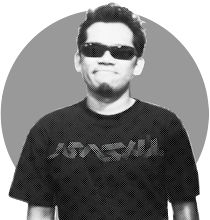
DATUM09, Convention Centre, Kuala Lumpur.
By the time I'm writing this post, DATUM:KL09 have concluded its 2 days talks. It was an inspiring session, a breath of fresh air of where we & architecture could/ should and will be heading next, and deeply taking a consideration of the current world problems and crisis in every (most) design aspects.
But my post today it's not about Datum, but the mindset in facing theses 'challenges' while heading towards the next step. There seems to be three major feelings of these challenges after that day and its all kind of mixed up.
Optimism
The feeling of optimism after attending Winy Maas of MVRDV talk regarding how design and basic problems solving plays a key role during crisis.
*That design could transcend beyond than just fulfilling the requirement and the needs.
*That through problem solving, design creates and engaged the public as a catalyst in triggering discussion, inspiration and.. hope.
*That there is the possibilities of the impossibilities, where the current crisis is the time for design to come forward.
Optimism is a calling for the architects and designers, to lead and be that light at the end of the tunnel through design.
Pessimism
"But how exactly we could face these challenges in being optimistic? Especially if the clients don't share our enthusiasm". Asked by one of the audience.
Maas explains during the Q&A session, "Look them straight in the eye. Find that inner guild buried deep inside them. Tap into it and bring them to a common ground with our design idea/ solution". Its like saying, I'm here to help you solved it. Now, let's do this!
Another reason for pessimism, raised during the session is the lacking of an open discussion nor debate in between design and the public. As being rectified by the moderator of the Q&A session, "So far, its have been a one way street".
But he did express the willingness of architects to be part in an engaging discussions and debate concerning the design and the public interest. As much as I want to place this paragraph in the optimism section, the moderator elaborate that "without the presents of other responsible factor in governing the outcome of the design such as clients especially the developers, the decision and policy makers in the discussion. It will just crippled any discussion nor debate".
I agree with his views, for example few months back, the roof of a multi million Ringgit stadium in Terengganu have collapsed.

Stadium Gong Badak, Kuala Terengganu, Malaysia. Before and after.
Source: http://www.skyscrapercity.com, http://www.basilgohar.com/
Me, as one of the Malaysian public felt pessimistic;
That we will never have a way of knowing the actual reason, who's responsible and will there be any form of closure.
Which bring us to, Cynicism
When all seems hopeless, it triggers a coping mechanism in all of us: Cynicism.
In relating to the issue of the collapse stadium roof, the public reacted and created their own version of reason of why and what really happen to the stadium. The causing factor and who's is responsible, cynically.
*Reason #1

Source: By an Unknown Author Via. Facebook
... or maybe *Reason #2

Source: By an Unknown Author Via. Facebook
I felt that, cynicism is a double edge sword. On one side, it triggers a unique way of discussing by not directly discussing the crisis and the other is leading towards pessimism and architects & designers getting caught in between of this downward spiral.
_
In my personal opinion, I feel optimistic towards the future;
*Design could be a 'tipping point' of change, that design could be a trigger for discussion and debate. That design, (like what I've discussed with my friend, Shuji), could in some way save a kid in Africa, if we choose too.
*Optimistic, because in Datum, we have stop debating about architecture styles and dive into the core of design: problem solving. Attempting to solved the world crisis through design and placing the quality of human experience within the build environment as the main priority.
*Optimistic because,... good design ideas and solutions are infectious.
But, we can't afford to wait for someone to make and bring us change.
We are the agent of change, that if, if we choose to be.
_
wm












No comments:
Post a Comment
comment/opinion